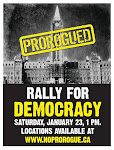The first problem with Harper's assertion that he is protecting democracy from a coup d'etat by socialist and separatist traitors who are manipulating the liberals to seize power (the Tory talking points all week), is that coalitions are expressions of the democratic will of the voters in a Westminster-style parliamentary system.
There are no legal preconditions for coalitions as Harper and his followers have asserted time and again. Here are a few of his creative interpretations on the formation of coalition governments:
- they run as a coalition during the election
- there can be no sovereigntists in a coalition
- there can be no social democrats in a coalition if that was dismissed during the election
- the economic must be strong.
Canadians now got a whiff of what a Harper majority would actually look like (shades of Mike Harris?). He would have exercised unbridled power. To hell with the other parties. To hell with public opinion. To hell with voters and other citizens.
Coalitions are no less undemocratic, than any other result in a first-past-the-post (single member plurality) voting system, the one Canada's been using since its inception as a country.
It is the voting system itself that is undemocratic because it usually produces governments that the majority of voters do not vote for. How does 37% (about 1 in 3) of votes translate into a so-called democratic mandate? To hell with the other 63%. They are just sore losers and whiners. Aren't you fed up with this?
Had we been voting under a proportional representation type of voting system where parties receive roughly the same number of seats in parliament as their percentage of the popular vote allows, the results would have been quite different:
Conservatives - 38% of the popular vote: 117 seats (not 143)
Liberals - 26% of the popular vote: 81 seats (not 76)
NDP - 18% of the popular vote: 57 seats (not 37)
Bloc - 10% of the popular vote: 28 seats (not 50)
Greens - 7% of the popular vote: 23 seats (not 0)
Using these hypothetical, but more democratic set of numbers from Fair Vote Canada, a different coalition could have emerged. The Liberals, NDP & Greens would have had 161 seats between them, enough to govern, even without the support of the Bloc. Fixing our undemocratic & dysfunctional voting system could have been one of the conditions for forming the coalition.
I know that the Liberal party does not support electoral reform. Why would they? At the federal level, they've probably benefited more than any other party to craft majority governments that don't have the support of the majority of the voters. However, there are Liberal party members, like Carolyn Bennett, Bob Rae, Michael Bryant and others who have been reform supporters. Let's hope they can see the wisdom of using this opportunity to advance the debate on PR.
At the same time, the Bloc would have little reason to support reform because their regional concentration of votes gives them more seats than their share of the national popular vote allows. What might motivate the Bloc to support electoral reform?
NDP voters support reform as a whole but the party itself may only support reform on paper. It remains unclear as to why this is not a larger priority for them since they're among the biggest losers on the national scene. It's unclear whether their provincial counterparts are a counter pressure to reform as they can occasionally benefit from the system.
At the end of the day, the proof is in the pudding. People claim to support things in order to look good but when it comes to taking action, "there's nothing we can do". As this political crisis continues to unfold, the upside of the G-G's decision to prorogue parliament is that it gives the coalition more time to coalesce and electoral reformers more time to get the issue on the national stage.













No comments:
Post a Comment